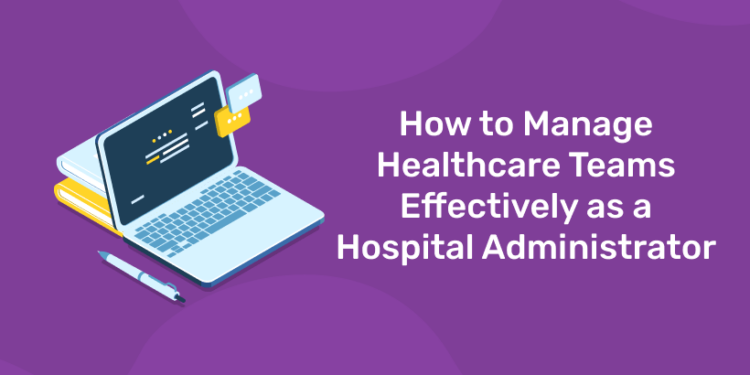Table of Contents
Managing healthcare teams effectively as a hospital administrator is critical to ensuring that patient care is both high-quality and efficient. As the backbone of hospital operations, administrators must skillfully balance the demands of healthcare delivery with the intricacies of team dynamics. Managing healthcare teams is key to a hospital running smoothly and delivering great patient care. As a hospital manager you have to balance patient, staff and organization needs. This article will look at how to manage healthcare teams effectively as a hospital Administrator, improve collaboration and create a positive work environment.
Understanding the Role of a Hospital Administrator
Hospital managers are responsible for the day to day running of a healthcare facility. Their job includes managing staff, ensuring compliance with healthcare regulations and implementing policies and procedures. Team management is a big part of this role, requires strong leadership, communication and organization skills.
Hospital admins have to do:
- Human resources: Hire, train and manage staff, create schedules
- Finances: Plan and manage budgets, expenses and funding
- Compliance: Make sure we are in compliance with laws and regulations
- Patient care: Work with doctors and other staff to deliver great patient care, collect and review patient and facility data to find ways to improve care
- Communication: Speak on behalf of the hospital to vendors, stakeholders, regulatory bodies and the public
- Goals: Create short and long term goals for the hospital and communicate facility needs and goals to managers, investors and board of directors
Explore Your Future in Healthcare Management! Enroll now
Strategies to Manage Healthcare Teams Effectively as a Hospital Administrator
1: What is the primary role of a hospital administrator?
1. Clear Communication
Clear communication is the key to good team management. Make sure all team members know their roles, responsibilities and the hospital’s goals. Regular meetings, clear instructions and an open-door policy can help create transparent and efficient communication.
- Regular Meetings: Have regular team meetings to discuss updates, concerns and important information. This keeps everyone on the same page and creates a sense of unity.
- Open-Door Policy: Encourage staff to speak up and share their ideas. An open-door policy builds trust and shows management values their input.
- Clear Instructions: Provide clear and concise instructions for tasks and projects. Ambiguity can lead to mistakes.
2. Team Collaboration
Create a culture of collaboration within your healthcare team. Collaboration leads to better patient outcomes, higher staff satisfaction and more efficient operations.
- Interdisciplinary Teams: Get interdisciplinary teams to work together on patient care plans. This utilises the expertise of different professionals to deliver holistic care.
- Collaborative Tools: Use collaborative tools and software to streamline communication and coordination between team members.
- Team-Building Activities: Organise team-building activities to strengthen relationships and improve teamwork. Activities like workshops, retreats and social events can create team cohesion.
3. Professional Development
Invest in your healthcare team’s professional development. Continuous learning and skill development is key to maintaining high standards of care and keeping up with industry advancements.
- Training Programs: Run regular training programs to keep staff up to date with latest healthcare practices and technologies.
- Mentorship: Implement a mentorship program where experienced staff can guide and support newer team members.
- Continuing Education: Encourage staff to pursue continuing education opportunities like certifications and advanced degrees.
4. Recognition and Rewards
Recognising and rewarding your healthcare team is crucial to maintaining morale and motivation. Acknowledgement of hard work and achievements can lead to higher job satisfaction and retention.
- Employee Recognition Programs: Create programs to recognise outstanding performance and dedication. Awards, certificates and public recognition can be effective.
- Incentives: Offer incentives like bonuses, extra time off or professional development opportunities for high performing staff.
- Regular Feedback: Give regular feedback and constructive criticism to help staff improve and grow in their roles.
Hospital Administration Course with Assured Career Growth
Hospital Administration Course by Entri App: Master essential healthcare management skills, gain certification, and secure top roles in leading hospitals
Join Now!Enhancing Collaboration in Healthcare and Manage Healthcare Teams Effectively as a Hospital Administrator
Collaboration in healthcare is key to good patient care and operational efficiency. Here are some ways to get your teams collaborating and Manage Healthcare Teams Effectively as a Hospital Administrator:
1. Shared Goals
Shared outcomes means everyone is working towards the same thing. Clear measurable outcomes helps to align everyone and give purpose.
- Goal Setting: Involve the team in setting realistic goals. This gives them ownership and commitment.
- Progress Tracking: Track and communicate progress towards goals regularly to keep everyone motivated.
2. Effective Leadership
Leadership is key to collaboration. Leaders should inspire, guide and support their teams to achieve shared outcomes.
- Lead by Example: Model collaborative behaviour and encourage it in others.
- Supportive Leadership: Give your team the resources, training and support to succeed.
3. Conflict Resolution
Conflict is inevitable in any team but effective conflict resolution can prevent it from killing collaboration.
- Open Communication: Encourage open communication to address conflicts early and constructively.
- Mediation: Have mediation processes in place to resolve disputes fairly.
Explore Your Future in Healthcare Management! Enroll now
How to Get Ready to Manage Healthcare Teams as a Hospital Administrator
Preparation is key to managing healthcare teams well. Here are some steps to get ready for this tough but rewarding role:
1. Education and Training
- Formal Education: Do a degree in healthcare administration, management or a related field. Courses in leadership, communication and healthcare systems are particularly useful.
- Certifications: Get relevant certifications like Certified Healthcare Administrator (CHA) or Fellow of the American College of Healthcare Executives (FACHE).
2. Get Experience
- Internships: Do internships or volunteer in healthcare settings to get practical experience.
- Work Experience: Work in different healthcare roles to understand the industry and build a broad skill set.
3. Key Skills
- Leadership: Develop leadership skills to lead and motivate your team.
- Communication: Improve your communication skills to communicate clearly.
- Problem Solving: Build your problem solving skills to tackle challenges and find solutions.
The Importance of Technology in Team Management as Hospital Administrator
Technology can help with team management and patient care. Here are some ways technology can help Manage Healthcare Teams Effectively as a Hospital Administrator
1. Communication Tools
- Instant Messaging: Use instant messaging for quick communication between team members.
- Video Conferencing: Use video conferencing for virtual meetings especially in large or multi-site healthcare facilities.
2. Collaboration Platforms
- Project Management Software: Use project management software to manage tasks, track progress and ensure timely completion.
- Electronic Health Records (EHRs): Use EHRs to share patient info securely and efficiently between healthcare professionals.
3. Data Analytics
- Performance Metrics: Use data to measure team performance and identify areas to improve.
- Patient Outcomes: Analyse patient outcomes to measure care and make data driven decisions.
Hospital Administration Course with Assured Career Growth
Hospital Administration Course by Entri App: Master essential healthcare management skills, gain certification, and secure top roles in leading hospitals
Join Now!Entri’s Hospital and Healthcare Administration Course
To excel in managing healthcare teams, consider enrolling in specialized courses that enhance your skills and knowledge. Entri offers a comprehensive Hospital and Healthcare Administration Course designed to equip you with the necessary tools to succeed in this role. This course covers key topics such as leadership, communication, financial management, and healthcare systems, providing a solid foundation for effective team management and Manage Healthcare Teams Effectively as a Hospital Administrator.
Conclusion
Managing healthcare teams is key to delivering great patient care and running a smooth hospital. As a hospital administrator it’s your job to facilitate communication, collaboration, invest in professional development and acknowledge your team. By doing these and continuously improving yourself you can create a great work environment and achieve organisational success.
Entri’s Hospital and Healthcare Administration Course can equip you with the knowledge and skills to do this. Invest in yourself and start now.
Hospital Administration Course with Assured Career Growth
Hospital Administration Course by Entri App: Master essential healthcare management skills, gain certification, and secure top roles in leading hospitals
Join Now!Frequently Asked Questions
What are the key responsibilities of a hospital administrator in managing healthcare teams?
Hospital administrators oversee daily operations, manage staff, ensure compliance with healthcare regulations, and implement policies and procedures to maintain high-quality patient care and operational efficiency.
How can effective communication improve team management in healthcare settings?
Clear communication ensures that all team members understand their roles and responsibilities, fostering a transparent and efficient work environment. Regular meetings, clear directives, and an open-door policy can enhance communication.
What are some strategies to promote collaboration among healthcare teams?
Encouraging interdisciplinary teams, utilizing collaborative tools, and organizing team-building activities can enhance collaboration, leading to better patient outcomes and increased staff satisfaction.
Why is professional development important for healthcare teams?
Investing in professional development helps maintain high standards of care, keeps staff updated on the latest healthcare practices, and enhances skills and knowledge, contributing to overall team effectiveness.
How can technology assist in managing healthcare teams?
Technology can improve communication through instant messaging and video conferencing, streamline operations with project management software and electronic health records, and use data analytics to monitor performance and patient outcomes.
How can Entri's Hospital and Healthcare Administration Course help in managing healthcare teams?
Entri’s course covers key topics such as leadership, communication, financial management, and healthcare systems, providing the necessary tools and knowledge to excel in managing healthcare teams effectively.












